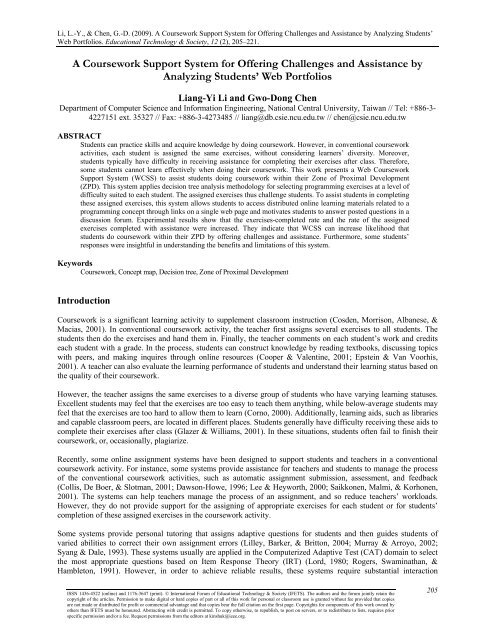Download - Educational Technology & Society
Download - Educational Technology & Society
Download - Educational Technology & Society
Create successful ePaper yourself
Turn your PDF publications into a flip-book with our unique Google optimized e-Paper software.
Li, L.-Y., & Chen, G.-D. (2009). A Coursework Support System for Offering Challenges and Assistance by Analyzing Students’<br />
Web Portfolios. <strong>Educational</strong> <strong>Technology</strong> & <strong>Society</strong>, 12 (2), 205–221.<br />
A Coursework Support System for Offering Challenges and Assistance by<br />
Analyzing Students’ Web Portfolios<br />
Liang-Yi Li and Gwo-Dong Chen<br />
Department of Computer Science and Information Engineering, National Central University, Taiwan // Tel: +886-3-<br />
4227151 ext. 35327 // Fax: +886-3-4273485 // liang@db.csie.ncu.edu.tw // chen@csie.ncu.edu.tw<br />
ABSTRACT<br />
Students can practice skills and acquire knowledge by doing coursework. However, in conventional coursework<br />
activities, each student is assigned the same exercises, without considering learners’ diversity. Moreover,<br />
students typically have difficulty in receiving assistance for completing their exercises after class. Therefore,<br />
some students cannot learn effectively when doing their coursework. This work presents a Web Coursework<br />
Support System (WCSS) to assist students doing coursework within their Zone of Proximal Development<br />
(ZPD). This system applies decision tree analysis methodology for selecting programming exercises at a level of<br />
difficulty suited to each student. The assigned exercises thus challenge students. To assist students in completing<br />
these assigned exercises, this system allows students to access distributed online learning materials related to a<br />
programming concept through links on a single web page and motivates students to answer posted questions in a<br />
discussion forum. Experimental results show that the exercises-completed rate and the rate of the assigned<br />
exercises completed with assistance were increased. They indicate that WCSS can increase likelihood that<br />
students do coursework within their ZPD by offering challenges and assistance. Furthermore, some students’<br />
responses were insightful in understanding the benefits and limitations of this system.<br />
Keywords<br />
Coursework, Concept map, Decision tree, Zone of Proximal Development<br />
Introduction<br />
Coursework is a significant learning activity to supplement classroom instruction (Cosden, Morrison, Albanese, &<br />
Macias, 2001). In conventional coursework activity, the teacher first assigns several exercises to all students. The<br />
students then do the exercises and hand them in. Finally, the teacher comments on each student’s work and credits<br />
each student with a grade. In the process, students can construct knowledge by reading textbooks, discussing topics<br />
with peers, and making inquires through online resources (Cooper & Valentine, 2001; Epstein & Van Voorhis,<br />
2001). A teacher can also evaluate the learning performance of students and understand their learning status based on<br />
the quality of their coursework.<br />
However, the teacher assigns the same exercises to a diverse group of students who have varying learning statuses.<br />
Excellent students may feel that the exercises are too easy to teach them anything, while below-average students may<br />
feel that the exercises are too hard to allow them to learn (Corno, 2000). Additionally, learning aids, such as libraries<br />
and capable classroom peers, are located in different places. Students generally have difficulty receiving these aids to<br />
complete their exercises after class (Glazer & Williams, 2001). In these situations, students often fail to finish their<br />
coursework, or, occasionally, plagiarize.<br />
Recently, some online assignment systems have been designed to support students and teachers in a conventional<br />
coursework activity. For instance, some systems provide assistance for teachers and students to manage the process<br />
of the conventional coursework activities, such as automatic assignment submission, assessment, and feedback<br />
(Collis, De Boer, & Slotman, 2001; Dawson-Howe, 1996; Lee & Heyworth, 2000; Saikkonen, Malmi, & Korhonen,<br />
2001). The systems can help teachers manage the process of an assignment, and so reduce teachers’ workloads.<br />
However, they do not provide support for the assigning of appropriate exercises for each student or for students’<br />
completion of these assigned exercises in the coursework activity.<br />
Some systems provide personal tutoring that assigns adaptive questions for students and then guides students of<br />
varied abilities to correct their own assignment errors (Lilley, Barker, & Britton, 2004; Murray & Arroyo, 2002;<br />
Syang & Dale, 1993). These systems usually are applied in the Computerized Adaptive Test (CAT) domain to select<br />
the most appropriate questions based on Item Response Theory (IRT) (Lord, 1980; Rogers, Swaminathan, &<br />
Hambleton, 1991). However, in order to achieve reliable results, these systems require substantial interaction<br />
ISSN 1436-4522 (online) and 1176-3647 (print). © International Forum of <strong>Educational</strong> <strong>Technology</strong> & <strong>Society</strong> (IFETS). The authors and the forum jointly retain the<br />
copyright of the articles. Permission to make digital or hard copies of part or all of this work for personal or classroom use is granted without fee provided that copies<br />
are not made or distributed for profit or commercial advantage and that copies bear the full citation on the first page. Copyrights for components of this work owned by<br />
others than IFETS must be honoured. Abstracting with credit is permitted. To copy otherwise, to republish, to post on servers, or to redistribute to lists, requires prior<br />
specific permission and/or a fee. Request permissions from the editors at kinshuk@ieee.org.<br />
205
















